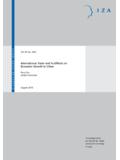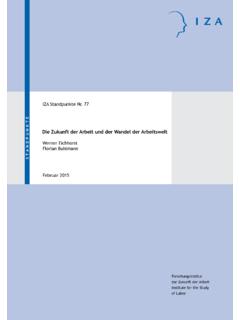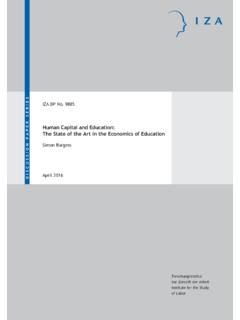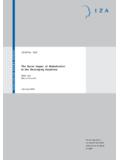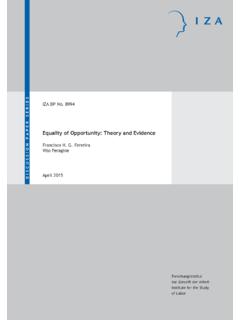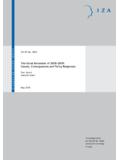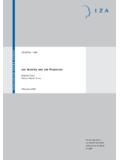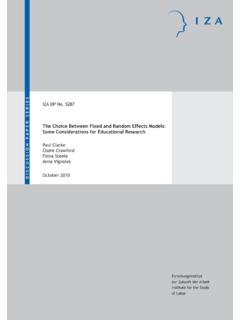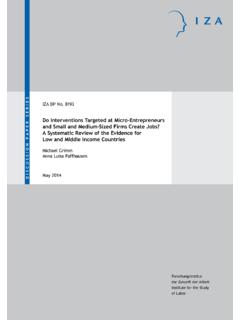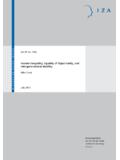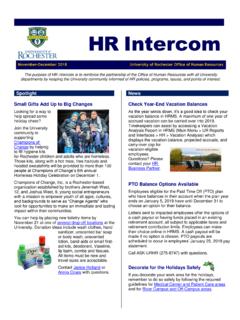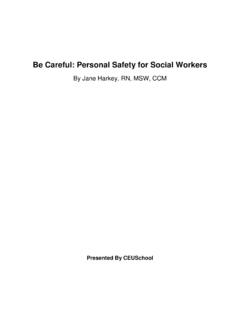Transcription of On the Escalation and De-Escalation of Conflict
1 DISCUSSION PAPER SERIESF orschungsinstitut zur Zukunft der ArbeitInstitute for the Study of Labor On the Escalation and De-Escalation of ConflictIZA DP No. 7492 July 2013 Juan A. LacombaFrancisco LagosErnesto ReubenFrans van Winden On the Escalation and De-Escalation of Conflict Juan A. Lacomba University of Granada Francisco Lagos University of Granada Ernesto Reuben Columbia University and IZA Frans van Winden University of Amsterdam Discussion Paper No. 74 92 July 2013 IZA Box 7240 53072 Bonn Germany Phone: +49-228-3894-0 Fax: +49-228-3894-180 E-mail: Any opinions expressed here are those of the author(s) and not those of IZA. Research published in this series may include views on policy, but the institute itself takes no institutional policy positions. The IZA research network is committed to the IZA Guiding Principles of Research Integrity. The Institute for the Study of Labor (IZA) in Bonn is a local and virtual international research center and a place of communication between science, politics and business.
2 IZA is an independent nonprofit organization supported by Deutsche Post Foundation. The center is associated with the University of Bonn and offers a stimulating research environment through its international network, workshops and conferences, data service, project support, research visits and doctoral program. IZA engages in (i) original and internationally competitive research in all fields of labor economics, (ii) development of policy concepts, and (iii) dissemination of research results and concepts to the interested public. IZA Discussion Papers often represent preliminary work and are circulated to encourage discussion. Citation of such a paper should account for its provisional character. A revised version may be available directly from the author. IZA Discussion Paper No. 7492 July 2013 ABSTRACT On the Escalation and De-Escalation of Conflict We introduce three variations of the Hirshleifer-Skaperdas Conflict game to study experimentally the effects of post- Conflict behavior and repeated interaction on the allocation of effort between production and appropriation.
3 Without repeated interaction, destruction of resources by defeated players can lead to lower appropriative efforts and higher overall efficiency. With repeated interaction, appropriative efforts are considerably reduced because some groups manage to avoid fighting altogether, often after substantial initial Conflict . To attain peace, players must first engage in costly signaling by making themselves vulnerable and by forgoing the possibility to appropriate the resources of defeated opponents. JEL Classification: C92, D72, D74 Keywords: Conflict , rent-seeking, appropriation, peace, Escalation , tournaments, contests Corresponding author: Ernesto Reuben Columbia University 705 Uris Hall 3022 Broadway New York, NY 10027 USA E-mail: 1 1. Introduction Conflict , defined as a situation in which agents employ costly resources that are adversarially combined against one another (Garfinkel and Skaperdas, 2012), is a widespread social phenomenon with occasionally huge socio-economic consequences.
4 A clear example is warfare. Other examples are political competition for dominance in public or private institutions, rent-seeking by political interest groups, litigation by contending parties, and business contests in marketing or takeovers. At the heart of these examples is typically a choice between a productive and an appropriative use of resources as means of pursuing wealth. In their seminal studies Hirshleifer (1988; 1991a) and Skaperdas (1992) model this choice as a contest between two players who allocate effort between production and predation , with a higher predatory effort increasing the probability of appropriating the other player s In the meantime, this literature has branched into various directions, among other things dealing with dynamic issues (like economic growth) and the formation of alliances, and has become part of a more general theory of Next to theory, an empirical economic literature on Conflict has developed.
5 This literature includes, for example, Keynes (1920) classic critique on the reparations demanded from Germany after World War I, the assessment of the impact of military expenditures on economic growth (Dunne and Uye, 2010), and recent cost estimates of warfare such as Nordhaus (2002), Stiglitz and Bilmes (2008), and several studies in Hess (2009) and Garfinkel and Skaperdas (2012). In spite of their undeniable value, field empirical studies like these are handicapped by definitional issues ( , which non-monetary costs to include), severe difficulties in gathering data, and a lack of control to disentangle driving factors 1 Garfinkel and Skaperdas (2012) review some earlier studies and refer to Haavelmo (1954) as the first one to model the basic choice between production and appropriation. Contest theory builds on the related rent-seeking model of Tullock (1980).
6 The main differences between Conflict models and rent-seeking models is that in the former the contested prize is endogenous and resources are locked into the contest ( , there is no safe haven; Neary, 1997a). These models are distinct from the literature on tournaments in that they focus on cases in which there are no positive externalities for third parties, which exclude, for example, sportive contests. 2 Excellent surveys are provided by Garfinkel and Skaperdas (2007) and Konrad (2009). 2 of Conflict and to determine their impact (see , Sk ns, 2006). In this respect, laboratory experimentation serves as an important complementary tool because it can focus on fundamental mechanisms through the control and opportunity to replicate that it offers. The experimental literature on Conflict is recent and small (see Abbink, 2012). For convenience, we will review this literature in the next section.
7 This paper presents an experimental study investigating the effects of post- Conflict behavior and repeated interaction on behavioral factors fostering the Escalation of Conflict or the advancement of peace. Behavior in the aftermath of Conflict is important for two reasons. First, its anticipation may influence the investment in Conflict . For example, it may restrain Conflict expenditures if the behavior of the defeated is expected to negatively affect the return on Conflict . Second, in case of repeated interaction between the contestants, post- Conflict behavior may be used for signaling purposes, affecting Escalation or De-Escalation of Conflict and the possibility of peace. We explore the importance of post- Conflict behavior by extending the Hirshleifer-Skaperdas model in two notable ways. First, we realistically assume that appropriation of production after a contest is an act in itself instead of an automatic consequence of winning.
8 This may be of importance, as experimental evidence suggests that agency matters, that is, people react differently to the same outcome depending on the intentions of the person behind it ( , Blount, 1995; Falk et al., 2008). Second, we include situations where the defeated party has the opportunity to increase the victor s appropriation costs by offering resistance or by applying scorched-earth tactics (Hirshleifer, 1991b). To some extent, the possibility that appropriation as such produces efficiency losses has been acknowledged in the literature by introducing an exogenous cost of predation (Neary, 1997b; Grossman and Kim, 1995; McBride and Skaperdas, 2009). In our setup, this cost is endogenous. More specifically, we investigate the following three extensions of the Conflict game. Total Conquest: In this extension, the winner of the contest gets to decide how much to appropriate of the loser s production (instead of automatically receiving all of it).
9 This additional stage, which is formally equivalent to a dictator game, allows winners to restrain themselves. History shows that victors have treated their defeated very differently. However, in reality, many factors typically play a role and the underlying 3 motives are hard to tease apart. Controlled experimental evidence on the dictator game suggests that people may show restraint in taking (see Camerer, 2003). Therefore, some investment in Conflict might be due to defensive reasons ( , protecting one s own production) or to a strong dislike of being defeated ( , because of betrayal aversion, Bohnet et al. 2008) as opposed to the desire to appropriate someone else s production. Total Conquest also serves as a benchmark for our other extensions of the Conflict game. Resistance: Because appropriation generally takes time, there may be room for a response by the defeated.
10 Often, the losing party of the contest may affect the ability of the victor to appropriate the capital, labor, or goods involved in production (see Sk ns, 2006). This can happen through capital or population flight, sabotage ( destruction of oil fields or crops), strikes, lower work morale, or the redirection of effort to a shadow economy. All of these reactions will typically be costly to both parties. In this extension, we therefore assume an additional stage where the loser of the contest knowing how much the winner wants to appropriate can decide to destroy part or all of his own production. In this case, the winner can commit to a rate of appropriation but cannot avoid an economically destructive response by the defeated that hurts Scorched Earth: The underlying argumentation for this extension is similar to the previous one but we now assume that the winner of the contest cannot credibly commit ex ante, so that the loser must decide how much to destroy of his own production before knowing how much the winner will For some dramatic military examples, one may think of the Kuwaiti oil fires started by the Iraqi military forces in 1990 when they were driven out by the , or Hitler s order to destroy all of Germany s resources when he realized he had lost the war.
